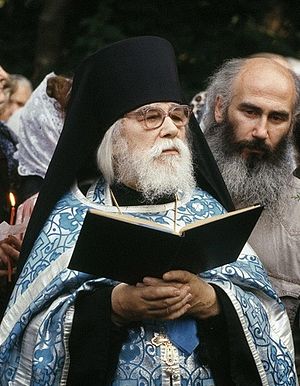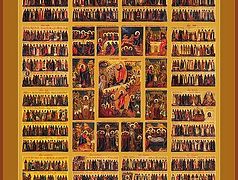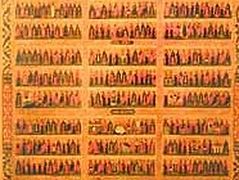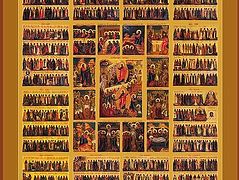This sermon was delivered on the day Patriarch Alexy II was enthroned. Fr. John talks about our apocalyptic times, and our calling to submit to God’s will as it is expressed in divine Providence.
The Entire Orthodox Church today celebrates the memory of all saints from all ages who pleased God, the leader of whom is the Most Pure Mother of God. This day is memorable for us every year, because although each of us marks his or her own name day—or angel day—on a specific day of the Church calendar, when the heavenly patron is celebrated, but on this day we also glorify all the saints who pleased God throughout the ages, including our own heavenly patrons, whose names we were given at the Sacrament of Baptism and given again to monastics at the tonsure into the ryassa, monasticism, or the great schema.
But today’s commemoration of all saints is particularly solemn for us because on this day in the cathedral church of Moscow our father and master Patriarch Alexei, who was chosen at the Council of Bishops, is being elevated to the patriarchal throne. At that Council of Bishops and during the following days there were present members of the clergy from all dioceses. Participating in this election were not only bishops and priests, but also laypeople. Therefore we all with one mouth and one heart chose the successor to the reposed Patriarch Pimen for the patriarchal throne.
For some, doubts have already arisen. Some speak about these doubts, some are already rushing to voice them through one or another printed page, that the election of a Patriarch took place too quickly this time—that it took much less than it did for the patriarch who preceded him. But apparently we have to proceed not from our own feeble, limited minds, but from a comprehension of Divine Providence, from the comprehension according to our strength and ability of the dates that are sacramental, hidden and known only to God, which we only later understand in times to come, so that we may mark them with prayer and the honoring of one or another chosen person.
If we take the period from the election of His Holiness Patriarch Tikhon, who is now a canonized saint, we have his successors Patriarch Sergei, Alexei I, and the newly-reposed Patriarch Pimen, whose forty days are commemorated tomorrow. Those periods were longer than what we have today. What is this sacramental event, hidden from many, about which the Lord says, “You can tell much about the world around you by one or another sign. How is it that you cannot discern the signs of the times?” (cf. Mt. 16:14). It is about this discernment of the signs of the times that the grace-filled monk of Holy Mount Athos, St. Nilos the Myrrh-gusher, spoke when he said that the time is coming (he did not say it but only confirmed it), and it will happen in way visible to all people, and not only to certain individuals. But what precisely is it? The speeding up of time.
From the pages of Holy Scripture we know that for the sake of the elect—and these are God’s own words—that the days of our earthly sojourn and our lives on earth will be shortened (cf. Mt. 24:22). And we know by such sayings that a year will be like a month, and a month like a week, a week like a day, a day like an hour, and an hour like a minute. It would be in vain, a waste of time to try to convince anyone, for we are all convinced of it by what we see before our very eyes. Those of you standing here beneath the domes of this holy church who are in your old age know that there were boundaries in time. There were boundaries for morning, for midday, for the afternoon, for evening, and for night. There were invisible boundaries. And it was as if someone slowly, quietly, and reverently turned the arms of time over the clock face. Now this is gone. We rise at dawn, go to bed at midnight, and are ever debtors in that we have not finished even a tiny part of what we were supposed to have done. This means that those words are already visibly being fulfilled; and in connection with this, if in fact the election of the predecessor to the newly-elected Patriarch Alexei took a whole year to complete (His Holiness Patriarch of Moscow and All Russia Alexei I died in April, and the election of the new patriarch took place exactly a year later). So why did it happen that way? As if we were going to search for a whole series of reasons with our curious but limited minds that are allowed to comprehend only a little and that in part. We would put our strength and energy into this, and for nothing. So, you’ve fit a year into a month—into forty days. Today is the enthronement of the new Patriarch, and tomorrow is forty days since the repose of his predecessor, Patriarch Pimen. But no, it seems to us that it shouldn’t have been done that way—because we do not know the sacred mysteries and do not know the hidden, most important reasons, which prompted those involved to speed up this matter, so that it would happen now, without delay.
And it would not be superfluous to fix your attention on the fact that the repose of His Holiness Patriarch Pimen happened at the very hour and minute that the Holy Synod was meeting. They did not need to be informed by telegraph or telephone, or any other means of communication. They were all assembled here, at the Patriarch’s residence, at that very hour and minute—this is why I am focusing attention on it—when they were on a lunch break, resting, and His Holiness Patriarch Pimen departed to the Lord, on May 3 of this year. Therefore there is no need to strain your mind, no need to waste your energy, no need to come to any of your own conclusions, but simply to give praise and thanksgiving for all that has happened.
Many consider that a different person should have been chosen. Perhaps you don’t know that throughout history this always happens when one or another person is chosen. The question arises: “It seems to me it should be thus and thus,” but it’s happened otherwise. We should remember the Savior’s words: “I give to whom I want. I do not ask anyone for advice and am accountable to no one. For I am God, the Ruler of life and death. I am the Chief Pastor of the Church both Heavenly and earthly” when you are filled with such confusion we as Christians might have, and peace will settle into your hearts, and submission to God’s will will settle into your inner man. Today we are speaking also on behalf of our ruling hierarch and our father abbot Archimandrite Pavel, who are now present there during these minutes among the many thousands of people who are praying and celebrating along with the new Patriarch being enthroned. This is what we should be thinking about right now.
This is not baseless talk, and there is a reason why I will reveal to you this inner secret—that on that very day and hour [of Alexy II’s election] the holy hierarch, chief hierarch, numbered among the saints, Patriarch Tikhon appeared, and near him was an enormous walking staff. A bishop has two staffs. One is used while celebrating the divine services, and the other is what he carries when walking in and out of the church. This staff was so large, so tall, and so heavy, that it could not be lifted. This is what we need to think about right now, so that with our prayers to the Lord (and not those made according to a special formula but from a pure heart) during these days, which are complicated days—even very complicated—we should pray and be obedient to the Mother Church and its first hierarch with the hosts of bishops and all the church clergy. We should pray that we would be obedient to God, the Mother Church, and hold sacredly to the purity of Orthodoxy. This is our task right now. Not in much talking, not in our discussions, which are of no use and have no firm foundation; this task in fact obligates us to penetrate with our attention all that is happening in our days and in life around us, both Church life and general human life, in our own country and throughout the world.
Therefore, this [patriarchal] staff is very heavy and complicated for the newly elected Patriarch, and we cannot carry it. It has been entrusted to him, and we should help him according to our strength with our prayers and obedience. And we should uphold the commandments given to us by the predecessors of the newly enthroned Patriarch Alexei to keep the old style [Church calendar—the Julian calendar]—we cannot accept a different one; to be strictly Orthodox. We have never related to any of the heterodox with aggression. Our conscience is clean in that respect. But we have walked our strictly marked path—as our predecessors did, so have we. And so we, ready any day now to depart to the other world, call upon you: Preserve the purity of Orthodox! And thirdly, that we would sacredly preserve the Church Slavonic language.
And the year that some are fearful about, the Eighth Ecumenical Council—do not be troubled over it, but only calmly believe in God. For the Patriarch who recently departed for eternity spoke to me in a personal conversation concerning these three questions also named a fourth—that if anything at the expected Eighth Ecumenical Council is passed that is not in agreement with the previous seven Ecumenical Councils, we have the right not to accept it. This was his testament, albeit spoken in a personal conversation, and I am repeating it for the second or third time as my conscience dictates, for I asked these questions and I received an answer to them. Therefore nothing troubles me now at all—neither the cutting short of time, nor the election. What has been and what shall follow can be summarized by understanding one thing: We are living in apocalyptic times. And therefore, what Patriarch Pimen, who was departing to eternity and whose fortieth day after reposing is tomorrow, said, is said again in the same words by the newly elected Patriarch Alexy of All Russia: Be vigilant! Stand firm in the faith! Be courageous and steadfast! And let all you do be with love (cf. 1 Cor. 16:13-14). Then we with the co-action of the grace of the Holy Spirit will fulfill both as a whole and in part the path of our journey, the path of our salvation leading from the earthly Church to the Heavenly Church, through our third birth—that is, the mystery of death.
It is also very significant that this very election as if coincides with the day of All Saints, although that is only according to our superficial understanding. Now we especially need the intercession of the Heavenly Church, so that the earthly Church would sacredly carry out the purity of its Christian teaching in the presence of various differences of opinion, discrepancies in interpretation, dialogues, and all possible expressions of our opinions. This should be for us a commandment from the one who has departed to eternity and the one who is now entrusted to lead the earthly Church. Therefore we shall now sincerely, from a pure heart, not allow any such thoughts, since our Chief Pastor is Christ. And I will remind you on behalf of the slain Metropolitan Benjamin of Petrograd, who was the deputy of Patriarch Tikhon. He said that the Church is ruled not by people but by the Lord Himself. And if He rules then why would we be troubled, as were the holy apostles in the terrible storm at sea. For the Lord said: “I am always with you. Be not afraid, it is I.”
Shouldn’t we recall the words of St. Ignatius (Brianchaninov), who wrote, “What should we do? With all the current apostasies which are already in action perhaps for more than one century now, each one of us should preserve himself and not be drawn into this stream that would carry us away from the path that the Lord Himself named: I am the way, the truth, and the life (Jn. 14:6). Our help cometh from the Lord, Who hath made heaven and the earth (Ps. 120:2).” Therefore together with the Heavenly Church, we in the earthly shall send up our prayers. Those who have boldness at the throne of the Most Holy and Life-creating Trinity shall send up their prayers, and we here, celebrating the Bloodless Sacrifice made for our sins and for human darkness shall also pray. And we will not try to strain our mind and heart. Everything is happening that should happen, and all in its own time. Then perhaps much that is now hidden from us will be revealed; but right now we need to remember these words of the apostle about which I have reminded you many times: Watch ye, stand fast in the faith, quit you like men, be strong. Let all your things be done with charity (1 Cor. 16:13-14). And may this love of Christ, filling our souls and hearts, be with us to the end of our lives, to our very last heartbeat, until our eyes are forever closed, so that we would be this way. And so that when we are asked the question, “Who are you?” we might answer, “Baptized, Orthodox, and following the path shown to us by the Lord and the Mother Church who loves her children! Yeah, Lord, let it be so. We today have already prayed, and even this is so pleasant. Could it be that no one perceived this? First the choir, right and powerful, then we clergy, and then the children with their children’s voices. It is as if everyone expresses this truth in his own way. This is connected with the seventh ode of the canon: “O ye children bless, ye priests chant, and ye people exalt Christ forever.”
Thus, we wish many long years to the new “rudder” of our Church, the Patriarch, and pray for the repose of the newly-reposed Patriarch. Our prayers will be made together with the prayers of the whole Church. Let us note that Patriarch Pimen’s funeral was served on Sunday, when in all churches the Bloodless Sacrifice is made. … That Sunday was also the feast of Great-Martyr George. And today is also Sunday, the feast of All Saints. If all the saints participate invisibly in the services on this solemn day, the enthronement of the new Patriarch, then might they abandon us? As we read in the Akathist and canons, these are our brothers and sisters. Next Sunday will be the feast of all Russian saints. Therefore, remember that the first pleiades of ten Patriarchs began with Holy Patriarch Job. The second pleiades, after two hundred years, began with the Holy Patriarch Tikhon [who died under the Communists]. Although, in between them was Holy Patriarch Hermogenes. Therefore today we will be filled with spiritual joy and at the same time concerned with our Christian duty—ceaseless prayer, in God’s churches as well as at home, in our cells, and other places where we turn to the Lord with prayerful sighs.
So, the Lord will prolong the life of our Patriarch and help him. We can only ask the Lord, but help will come to the Patriarch from the Father of Lights on high, from the Chief Pastor, Christ, and from the Holy Spirit. And Patriarch Pimen who bore the Patriarchal staff for twenty years will tomorrow be sent on to eternity and receive the reward for his labors in guiding the ship of the Russian Orthodox Church…
Let us pray to the Lord. May the Lord grant all that we have asked of Him today at the moleben of thanksgiving. Everything is set forth there, for whom and for what. We have asked on behalf of the whole Church, of our monastery, and of each of us individually that the Lord would not deprive us of His mercy. And since He will not deprive us, since He will be with us, then we have nothing to fear—not in the past, nor in the present, nor in the future.
I congratulate all of you with Holy Communion. May the Holy Mysteries of Christ bring you health of soul and body… Note also, that tomorrow is the day we commemorate the icon of the Mother of God, “Surety of Sinners”. His Holiness Patriarch Pimen especially loved and venerated this icon, and this will be his fortieth day after his repose. I again greet you all with your name day. Amen.




